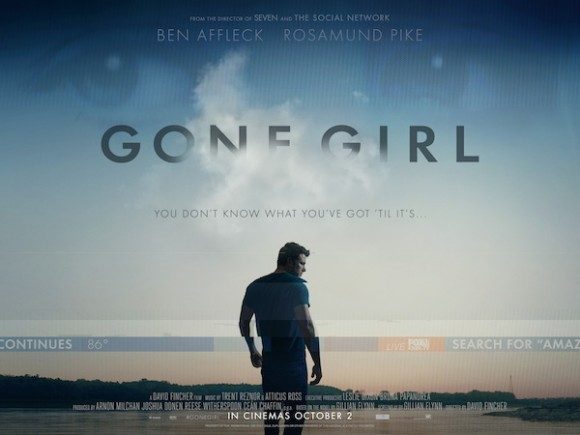Even though writer Gillian Flynn has (apparently) changed the ending from the novel, I can’t imagine how different an experience it must be to go into Gone Girl knowing pretty well what happens and maybe more importantly, how. I haven’t read the book, and so David Fincher’s latest thriller was able to manipulate me every step of the way just like it wants to. I don’t mean that disparagingly; Gone Girl is a movie about both control and identity. It works hard to make you draw conclusions about its characters, and then works equally hard to undermine those opinions. To compare to previous Fincher films, this has all of the interpersonal tension of The Social Network put into the murder mystery of Zodiac, and in terms of overall quality it probably falls right between the two.
If you’ve followed any of ours or anyone else’s coverage of this point, you’re probably familiar with the premise of the movie: man’s wife disappears, and while heading up a search that incurs more and more media attention, he becomes a key suspect himself. Usually I give a bit more than that in my reviews, but Gone Girl is one of those movies that lives in its twists and turns, and to begin even to uncover where and how those turnabouts occur is to undermine the main draw here. Gone Girl is a thriller that wants to play with your emotions, and it will wind you up like so much clockwork.
That’s also to say that the plot, with the exception of a somewhat slow and muddled start and an ending that, though changed, isn’t as satisfying as you’d hope, is a very nifty piece of work. Ben Affleck plays Nick Dunne with Rosamund Pike as his disappeared wife Amy, but we’re given ample time to see the two as a couple through a series of flashbacks led by voiced-over entries in Amy’s journal. As much as I want to talk about the plot mechanics, I said I won’t, so instead I’ll turn to the performances by Affleck and Pike. If the plot is draw number 1, it’s no disservice to say that Affleck and Pike are together 1A. Affleck doesn’t feel like he’s stretching himself in any noticeable way, but that may be because the part is rather similar to his role in Terrence Malik’s To the Wonder. Good casting can’t be held against him, and Affleck seems a perfect fit for the complex creation that is Nick Donne. In terms of sheer acting chops, though, the top marks have to Pike as Amy, who matches Nick turn for turn and then some. Shout outs, too, to Tyler Perry as a high-powered defense attorney and Carrie Coon as Nick’s twin sister Margo.
What I think audiences will have the most varied reaction to, however, is the overall pulpiness of the story. Once again, this is not an indictment of the film, but rather its best descriptor. This is pulp fiction at its finest. It’s no brooding deep inquiry into humanity’s deeper problems, and it doesn’t need to be. It’s a focused story about particular people with particular problems which we in the audience may not be able to personally relate to, but damned if the ride isn’t fun anyways. It’s escapism, but it’s smart escapism; as I said at the top, Gone Girl wants you the viewer to like its characters, or don’t, and then it wants to test you. What you’re never allowed to do is sympathize wholly with any one person. It requires engagement from its audience, and with Fincher at the helm, it earns that engagement.
The Verdict: 4 out of 5
Gone Girl isn’t the most significant movie you’re ever going to see. Some bobbles at the beginning of the movie and an extra step on the landing mean it won’t be the best, either. But the narrative gymnastics on display are world class, abetted by strong leading performances from Ben Affleck and Rosamund Pike and a director in David Fincher who’s made a career of squeezing the most from complex plots. Pulp fiction at its finest, Gone Girl will play with you, make you question your own conclusions about its characters, and take you on a heck of a thrill ride.



